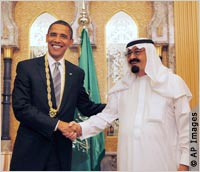
03 June 2009
Obama Opens Talks with Saudi King Abdullah

Washington — President Obama says he wanted to seek the counsel of Saudi Arabia’s King Abdullah as he begins a major initiative to address many of the thorny issues that confront U.S. relations in the Middle East and with the Muslim world.
“I’m confident that working together the United States and Saudi Arabia can make progress on a whole host of issues and mutual interests,” Obama said June 3 before a private meeting with King Abdullah at the king’s Royal Farm in Riyadh.
The centerpiece of President Obama’s five-day visit to the Middle East and Europe will be his speech June 4 at Cairo University on U.S. relations with the Muslim world, White House advisers said. “President Obama’s speech will be an important part of this engagement with the Muslim world, which began in his inaugural [speech] and has continued through venues such as his interview with Al Arabiya, his Nowruz [Persian New Year] message, and his speech and town hall [meeting] in Turkey,” White House press secretary Robert Gibbs said.
Gibbs cautioned that a single speech will not change everything. “I think it will take a sustained effort, and that’s what the president is in for,” he said. The Cairo speech is not expected to offer new policies, White House advisers told reporters in a pre-trip teleconference, though the president will address difficult topics.
The meeting between the Saudi monarch and Obama is the president’s second in three months. Obama met at length with King Abdullah during the G20 Financial Summit in London in early April.
“As I take this trip and we’ll be visiting Cairo tomorrow [June 4], I thought it was very important to come to the place where Islam began and to seek his majesty’s counsel and to discuss with him many of the issues that we confront in the Middle East,” Obama said. The president arrived in Riyadh overnight from Washington and was given a state welcome by King Abdullah.
The talks are expected to range from the Israeli-Palestinian peace negotiations to oil prices, which have been rising in recent weeks, to Iran’s nuclear weapons ambitions.
“I am not surprised, given the historic and strategic ties between our two countries, I believe that go back to the time of the meeting between the late [President] Franklin Delano Roosevelt and the late [Saudi] King Abdul-Aziz,” King Abdullah said.
After their meeting in Riyadh, Obama travels to Cairo June 4 for private consultations with Egyptian President Hosni Mubarak and then gives his much anticipated speech on the campus of Cairo University. The speech is being co-hosted by Al Azhar University. The president then travels to Dresden, Germany, on June 5 for talks with German Chancellor Angela Merkel along with several other visits in Germany, before wrapping up his trip June 6 in France with French President Nicolas Sarkozy and ceremonial events to mark the 65th anniversary of the World War II D-Day landings by Allied forces.
What foreign affairs decisions should President Obama consider? Comment on America.gov's blog.
